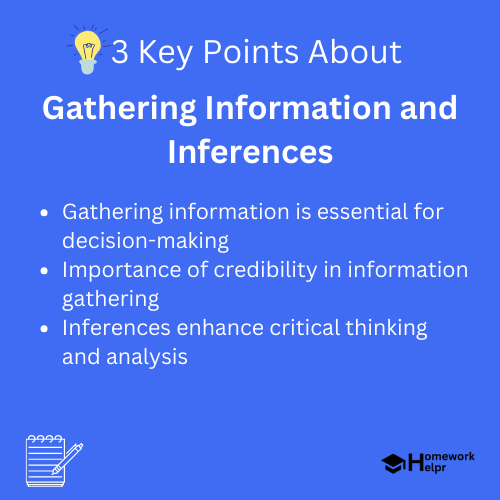📝 Summary
In daily life, the ability to gather information and make inferences is crucial for effective decision-making. Gathering information involves collecting data from credible sources through methods such as surveys, interviews, observation, and research. Credibility is key when sourcing information, ensuring it is reliable and relevant. Making inferences is about analyzing this data to draw logical conclusions, enhancing critical thinking skills. This process is applicable in various fields, such as healthcare, marketing, and science, aiding individuals in understanding the world and making informed choices.
Gathering Information and Inferences
In our daily lives, we often find ourselves posed with questions, challenges, or even puzzles. The ability to gather information and make inferences about situations is essential. Be it in academics, social interactions, or critical decision-making, these skills can aid us in understanding the world better. Gathering information typically involves collecting data from various sources, while making inferences is about interpreting that data to draw conclusions.
When we discuss gathering information, we touch upon several important aspects such as sources, methods, and ethics that govern the information we collect. Subsequently, making inferences involves using reasoning and judgment based on the information at hand. Let’s dive deeper into these two critical components.
What is Gathering Information?
Gathering information refers to the process of collecting relevant and credible data to answer specific questions or make informed decisions. The following are some common methods to gather information:
- Surveys: Conducting questionnaires to collect data from a sample population.
- Interviews: Engaging in discussions with individuals to extract detailed insights.
- Observation: Watching events or behaviors in real settings to gather firsthand information.
- Research: Utilizing books, articles, and online resources to find background information.
Each of these methods can be tailored to suit the nature of the inquiry. For example, if we’re interested in understanding how students feel about their school environment, conducting a survey can provide quantifiable results. It enables us to gather sufficient and diverse perspectives. On the other hand, through observations, we can witness interactions that might not be captured in a survey.

Definition
Survey: A method of data collection that involves asking individuals questions to gather information on various topics.
Examples
Consider an educational institution wanting to enhance student learning. They could conduct surveys to assess student opinions on different teaching methods, leading them to gather valuable insights.
Importance of Credibility in Information Gathering
Not all information is reliable or accurate; thus, understanding credibility is vital. Information should be gathered from trusted, reliable, and relevant sources. Here are some tips for validating sources:
- Check the author’s credentials and expertise.
- Look for peer-reviewed studies or articles.
- Assess whether the information is current and updated.
- Evaluate the motives behind the source of information.
By following these guidelines, individuals can ensure that the information they gather is not only credible but also applicable to their needs. This will enable them to make well-informed inferences.
What are Inferences?
Inferences are conclusions drawn from the available evidence and reasoning. It is not merely guessing but rather a logical process based on the information at hand. For instance, if you observe that a classmate has brought a lunchbag every day for a week, you might infer that they love homemade lunch.
Definition
Inference: A conclusion reached on the basis of evidence and reasoning rather than from explicit statements.
Examples
When studying different climates across the globe, a student might observe that certain regions have less vegetation. From this observation, an inference could be made that these areas experience less rainfall.
The Process of Making Inferences
Making inferences involves a few important steps that can be effectively practiced. Understanding these steps can enhance critical thinking and analytical skills:
- Observation: Gather thorough data through various methods.
- Analysis: Break down the information to examine patterns or trends.
- Hypothesis: Formulate an educated guess or hypothesis based on data.
- Conclusion: Draw a conclusion, understanding that it might not always be accurate.
The systematic approach can lead to more precise and valuable inferences. In educational settings, students frequently utilize this process in subjects like science and literature, where they analyze data and texts.
Fun Fact about Inferences!
❓Did You Know?
Did you know that inferences aren’t just used in academics? Detectives use them to solve cases based on the evidence they find!
Real-World Applications
In both personal and professional realms, the ability to gather information and make inferences is pivotal. Here are some examples:
- In healthcare, professionals gather patient symptoms to infer possible diagnoses.
- In marketing, companies analyze consumer behavior data to make inferences about potential trends.
- In science, researchers collect data through experiments to infer relationships between variables.
These examples demonstrate that the skills of gathering and inferring can be applied across various scenarios, ranging from daily life choices to complex professional analyses.
Conclusion
The capacity to gather information and make sound inferences is a fundamental skill that significantly impacts our understanding of the world. Through rigorous data gathering and analytical thinking, we can draw meaningful conclusions that aid our decision-making processes. As students, developing these skills will pave the way for academic success and better prepare you for various real-life scenarios. So the next time you encounter a question or a problem, remember to gather, analyze, and infer!
Related Questions on Gathering Information and Inferences
What is gathering information?
Answer: It is collecting relevant and credible data.
What methods can be used for gathering information?
Answer: Surveys, interviews, observations, and research.
Why is credibility important in information gathering?
Answer: To ensure the information is reliable and applicable.
How do inferences relate to evidence?
Answer: Inferences are conclusions drawn from available evidence and reasoning.
